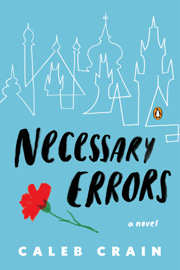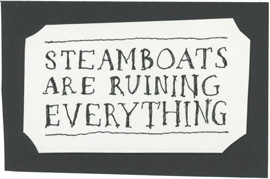In the empty room, he slowly wiped clean the blackboard. Before he remembered that Edgar might have notes in his satchel, it was too late to look at them: a girl was hesitating in the doorway.
“Come in,” said Bernard.
“Where’s Mr. Price?”
“He’s not feeling well.”
“He’s sick,” she said, interpreting. She scooted herself up into one of the room’s grown-up chairs. “Will he die?” she asked, with a certain archness. Dying was so abstract. If a child this young were to cry over someone’s death, it would still be an experiment. She would be trying out the sensation of crying to see if it helped in such a case.
“I think he ate some bad fish,” Bernard answered. “Fish that wasn’t cooked right,” he added, to disavow any moral implication.
“Where’s Mr. Price?” asked a boy.
“He ate bad fish,” the girl replied. “He won’t die from it.”
“Why would he die from it?” muttered the boy.
Bernard asked for the two children’s names and memorized them by teacherly method. The girl was named Francie because, he decided, she was a philosophe, and the boy was Warren because he was the size of a rabbit. Bernard hoped for a while that Edgar might recover or that the pastor might send a fitter replacement, but more children arrived instead.
He gave up. “What do you guys usually do with Mr. Price?”
“Talk,” said a girl.
“Do you have workbooks?”
“No!” said one of the boys, too loudly. Giggles.
“Apparently we’re supposed to talk about discipleship.” He sensed the children preparing themselves to be bored. He himself was prepared to be bored; perhaps it was the safest way. “Do you know what discipleship is?”
It mortified them to be asked, and they looked down into the tabletop.
“It’s when you follow baby Jesus,” Francie reluctantly offered, out of what he sensed was kindness for an awkward old man.
“I don’t know if we follow him as a baby.”
“At Christmas we do,” she retorted.
“That’s true. Maybe we follow him at different ages at different times.” This is a disaster, Bernard thought. Without content and yet vaguely antagonistic. “What does it mean to you to follow him? Warren?”
“Do what he does.”
“And what’s that?”
Warren shrugged. “Take care of people.” Had Jesus done much of that, really? Mostly, in Bernard’s memory of the stories, his end had been to cause trouble, even if healing and feeding were occasionally his means. But it was a harmless suggestion.
“Give things away,” said another boy. Also harmless. Bernard nodded.
“Die,” said Francie.
Bernard wasn’t sure how to respond.
“He did die,” she insisted.
“True,” he admitted. There was something terrible about the girl.
Read more in our mobile app Little Star Weekly, where we have serialized “Quitting Time” over our last three issues, or our print edition, just out: Little Star #5 (2014)
Caleb Crain is the author of a critical study, American Sympathy, and the novel Necessary Errors. Necessary Errors
was recently included in the Wall Street Journal’s best fiction of 2013 list and named one of the ten best debut novels of 2013 by Flavorwire. Read James Wood’s review in The New Yorker and Norman Rush in The New York Review of Books.


